After a summer of debate, Detroit limits RVs on residential property

For most of the summer, a group of Detroit residents wore light blue shirts that read “Spirit of Detroit, Lake Sun, Family Fun, RVs, Long Live Tradition.”
They showed up in large numbers to City Council meetings and other community events in an effort to convince the city to continue to allow property owners to have up to four RVs on their properties, something it has done for nearly a decade.
In the city that is still rebuilding from the Labor Day wildfires of 2020, it’s been the most contentious issue in decades, igniting passions and dividing much of the city.
After a summer of city council meetings and heated public debates, the Detroit City Council voted 5-2 Tuesday to allow property owners to have one RV on their property full time, a second RV in the summer with a permit and a third RV with a conditional use permit if the lot is 10,000 square feet or larger.
“I think this is what we had to do for the city,” Detroit Mayor Jim Trett said.
But many in the group that wanted the city to leave the regulations on RVs aren’t happy with the final decision.
“It’s sad that all of this has happened and it’s caused a divide up there,” Tina Russell, one of the main opponents of the change, said.
What Detroit's current RV code allows
Detroit’s previous code allowed two RVs on each property and a third and fourth RV with city permits and fees.
The council did that to encourage people to live on their properties while building homes on their properties.
Building homes in Detroit, population 200 and located in east Marion County, wasn’t as easy as in some cities because there is no sewer system and the homes must have septic systems.
Many people in the city used the city’s code to allow friends and family to bring their RVs in the summer during the height of the recreation season at Detroit Lake when campgrounds and the few RV parks in the city inevitably fill up with out-of-towners.

The city started looking at making changes to the code to restrict the number of RVs in 2019 but didn’t take action.
After the wildfires of 2020 wiped out about 75% of buildings in the city, it became harder to rebuild homes so they put off a decision.
In the past year, the council started having discussions about changing the code again.
Some property owners, they said, were putting RVs on their properties and showing no signs of rebuilding.
Many say they haven’t been able to start rebuilding due to restrictions, and some say they won’t be able to.
“We are still in recovery from the fires and the infrastructure is still being built,” said Lee Layman, who owns nine properties in town. “To limit potential investors and supporters of this town is insane.”
City says RVs limit income
One of the main arguments for restricting RVs on private property is the impact that has on the city’s finances.
When people don’t build homes, officials said, property taxes are only collected on the property. That means the city gets less money to operate.
Debra Bowman said she has lived in Detroit for 45 years.
“Property taxes aren’t being paid by trailers. We want homes, the community wants homes,” she said. “We don’t want it turned into a trailer park. We want residents who are going to be here.”
But others said they bought their properties under the previous code allowing up to four RVs, and that it should have remained because of that.
Christine Rasmussen said she purchased a three-acre property in the city limits with the idea of having her family’s RVs on the property in the summer for vacations.
She said she had the property changed from commercial zoning to residential and had a home built on it. She has three grown children and 16 grandchildren and great-grandchildren who come and stay in RVs on the property.
“My suggestion would be to leave the RV ordinances the same and hire an enforcer,” Rasmussen said. “A code enforcer would solve every problem the city has.”
The new restrictions and possible appeal
The new restrictions aren’t going to change much for some property owners, other than having to put more effort into getting permits from the city.
And they’re going to have to make sure any RVs on their property are 15 feet from the front yard and five feet from the side of the property.
“They’re going to have to show that they can meet all the setbacks,” Trett said.
But that didn’t sit well with those who have been fighting the changes.
“Why did we have to go through so much and listen to so much testimony?” Russell said. “It really is disheartening. And really, I feel that it’s a vendetta against us. Against the people who really fought it. They never took any of it into consideration.”
Russell said the Spirit of Detroit group is meeting with an attorney and they will decide whether to appeal the city council’s decision to the state’s Land Use Board of Appeals.
Bill Poehler covers Marion and Polk County for the Statesman Journal. Contact him at bpoehler@StatesmanJournal.com
This article originally appeared on Salem Statesman Journal: Detroit limits number of RVs allowed on residential property

